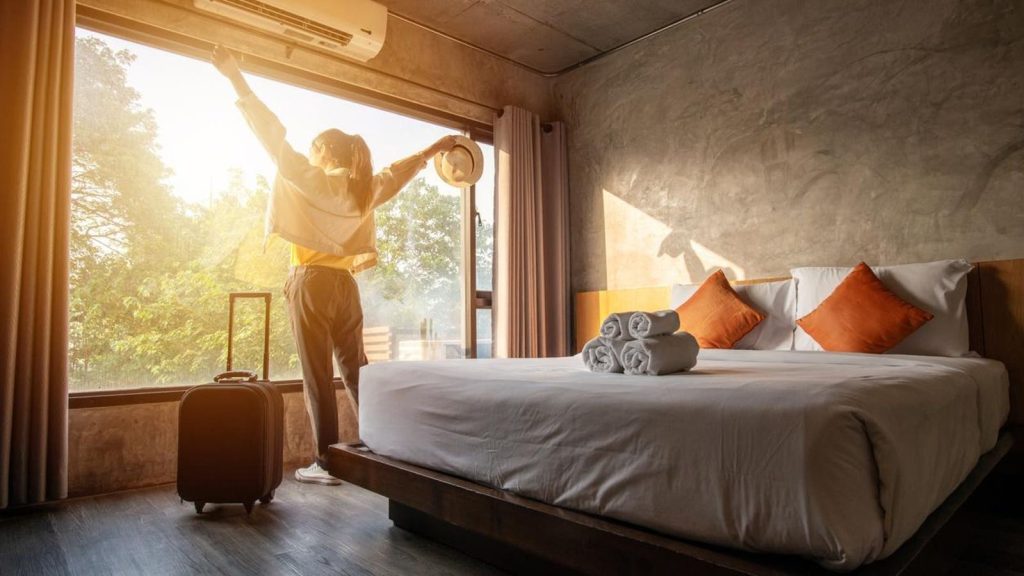The global hospitality market reached nearly 4.7 trillion U.S. dollars and was forecast to grow to 5.8 trillion U.S. dollars in 2027. There has been a lot of disruption to this economic sector since the pandemic, including food, drink, accommodation, and leisure activities like golf and amusement parks.
Since my business career began in this sector and I have a passion for it, I am curious about where this market is heading, so each year, I asked the senior class of The Fritz Knoebel School of Hospitality Management of the Daniels College of Business at the University of Denver to give me their perspective.
Over the last five years, my team and I have had the honor to partner with the Director, David Corsun, PhD of this global top-tier program focusing on social impact and humane management practices. We have co-created an annual experiential retreat with his fantastic team called the Fritz Leadership Symposium, which includes a two-day live retreat in the Fall culminating in the students presenting “vision pitches” for how their lives and livelihoods will look in the future
Each year, the students vote for three classmates to represent them based on their vision pitches. This year, they honored Jessica Bryan, Aansha Sankla, and Haena Kim, who won the opportunity to be on the Compassionate Leaders Circle Podcast through their efforts.
The objectives of the self-reflective program are:
· I have built authentic relationships with my peers while increasing my ability to connect and be compassionate with people.
· I can envision multiple versions of my future and feel prepared for unexpected career pivots.
· I have written personal and professional purpose statements that I refer to when making decisions.
· I can confidently articulate an ideal long-term professional vision for my future.
· I have a comprehensive career and personal plan for my senior year that connects to my long-term vision.
Part of this process is generating ideas for the industry for ten years from now in four categories: planet, products/services, profit, and people. Here is the input this year’s class, in their own words, gave us in September:
Planet
● Eco-friendly technology
● Composting options within hospitality (hotels, hostels, events, etc.)
● Renewable energy
● Healthier foods that are affordable for the general population
● Corporate change in emissions to reduce climate change
● Hotels/resorts reducing their carbon footprint
● Sustainable energy sources in every hotel
● Sustainability initiatives are a requirement for restaurants, hotels, golf courses, etc.
● No more single-use toiletries in hotels
● Utilize more LEED-certified buildings in the industry
● Food waste will go to produce power with biodigesters instead of going to landfills
● Regulations and fees on wealthy individuals to pay/offset their contributions to pollution
● More efficient laundry service to reduce energy waste
● Using compostable sustainable resources
● Adaptive reuse from office buildings to hotels is more costly but better for the planet
● More education for higher management on greener choices
● Focus on the circular economy
● Hotels and restaurants that are fully sustainable, meaning they have come up with a way to decrease waste, especially in restaurants
● Hotel turnover rather than developments
● More green energy and strive to decrease carbon emissions
Products and Services
● I think boats/yachts/water travel will gain popularity
● Efficiency of humans and technology working equally, not a complete takeover
● More automated products like self-checkout at coffee shops
● More self-serve service in the LVX side of hospitality
● Technology/AI will take labor-intensive jobs away
● Focus on the longevity of ideas and long-term environmental impacts
● Technology will not eliminate jobs but be used in conjunction to leverage people’s strength
● Hotels that strive to have a more worldly focus
● Remote hospitality services, like wellness retreats that are more affordable
● More wellness-focused amenities at hotels/resorts
● New & innovative restaurants with chefs who want to push the boundaries of cuisine
● Create connections with guests/clientele to help grow your business
● Wellness-focused services
● Restaurant experience like in our rap, you go out to a garden, pick your fruit, veggies, herbs, etc. Please bring it back to an open kitchen, and you get the experience of cooking your meal while learning about the products in your food.
● Wellness-focused hotels, mental health-focused services
● Personalization, internet footprint, waiver from hotels to look and use your data to make you a unique personalized experience
● More health-driven products/activities
● Theme-centered experiences
● Non-material services that benefit long-term wellness
● Developing fully sustainable hotels, fitness for guests
● Wellness Wednesdays
Profit
● Tipping culture will shift; how will we make the shift
● How will we ensure that everyone will have a fair and shared knowledge of technology as tech continues to develop in the future
● The company focuses on ESG (environmental and social goals), consumer-like this
● Investing money in universities so once they graduate, they work for you and make you money
● Finding ways to benefit employees so they are happy
● Companies share profits with workers; corporate workers take a lesser wage to spread to others.
● Raising wages to be livable
● Increasing employee benefits and investing in staff mental health
● The wealth will be distributed-liveable wages instead of CEO and owner corporation
● Higher wages for employees that are actual liveable wages and not paycheck-to-paycheck
● Companies will invest in students more during undergrad so they succeed with the company post-grad
● In select service hotels, profit margins will become higher with more tech automation
● A way to generate enough profit in restaurants to pay tipped employees a livable wage
● With fair living wages, it is easier to climb up the executive ladder in the hospitality industry
● Purpose = profit
● Employees will be paid better, more attraction will be drawn to hospitality, and profits will naturally grow as employees perform better.
● Motivate employees, leading to maximizing profits.
● Higher wages, better company culture
● Raising wages for overall employee wellbeing
● Making incentives and benefits for employees so they feel empowered to serve guests well
● Increasing profit by having actual breaks in the hospitality industry so people will perform better
● Increase employee wellbeing and make sure each employee feels valued and heard by the company
People
● More communication between managers and coworkers that builds trust
● Empower employees to take breaks/walks so they can better serve guests (mental health awareness)
● Teams full of people in different geological locations with the help of remote work
● People will not be so focused on working for tips
● Allow a “day in the life” for every department
● Increase employee wellbeing, focus on generating company culture first
● Connections and mental health focus
● Bonding activities for employees outside of the workplace
● In the workplace, having a therapist available to help everyone
● highlight/emphasize mental health–walks, access to therapists or professionals
● Company retreats and adding more culture to companies that aren’t as corporate because, in the past, it was the corporate jobs that mainly had a good work culture
● More focus on prioritizing physical health along with mental health
● Tipping in hospitality will not be as common; liveable wage will be the new trend
● All workplaces treat employees as people rather than a number or asset
● Employees will not be living paycheck to paycheck
● People will get paid a fair living wage
● More diversity in age, race, gender, sexual orientation, etc. in management
● Offer mental health benefits, not just physical to employees
● Tip pools allow employees to work together since they’re not worried about splitting tips themselves/making tips on their own
● How we can ensure that employees/workers have access to affordable housing
● I want management to be reflective of the diversity in their workforce. Professors teaching hospitality will be diverse in identities and experiences.
The school’s motto is Be Bold. Do Good. Help Others. As part of the program, we teach students the principles of Compassionate Leadership, a natural fit for these younger adults who have learned how to incorporate self-awareness and social impact into their visions as future leaders at this remarkable institution.
In addition, Corsun wanted to better prepare his undergraduates for their transition from school to work while developing their bonds with one another for their last year and beyond. The curriculum of the interactive program follows the Donnellan Method, which has helped people of all ages learn more about themselves so they can find and pursue a career path that best suits them:
This method has been used at schools, an ashram, a prison and Fortune 500 companies to facilitate individual and community changes. Corsun offers, “Our work with Compassionate Leaders Circle is a partnership I cherish; it helped our graduating seniors develop deeper connections with each other, identify what’s important to them, and articulate a clear career vision for their future. It has become essential to our culture and adds tremendous value to our students and alumni.”
Learn more about Compassionate Leaders Circle and our tools for creating visions and more satisfying work here.
Read the full article here










